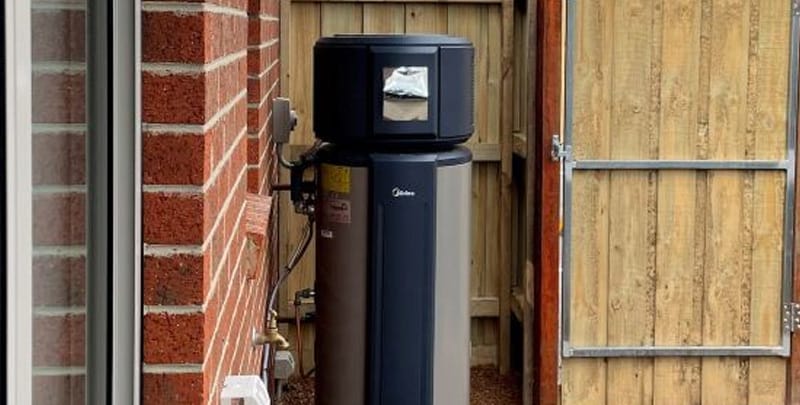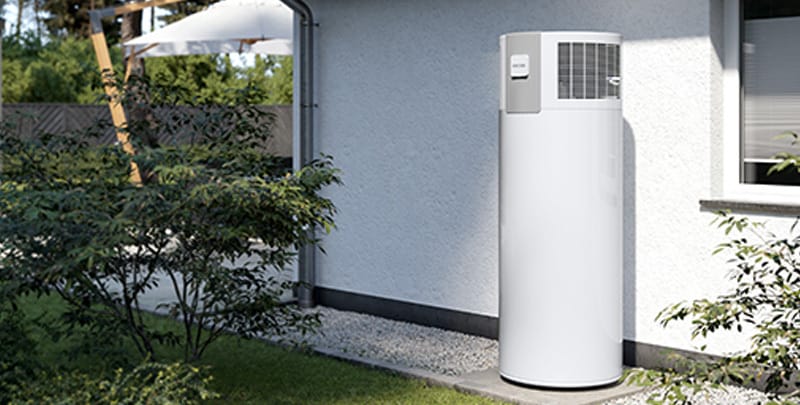
Heat Pump Water Heaters: Everything You Need to Know
Heat pump water heaters are innovative appliances designed to make water storage tanks provide energy-efficient solutions for heating water.
Unlike traditional water heaters, which rely on electricity or gas alone, heat pump water heaters leverage the above ambient temperature and air’s warmth to heat water. This technology makes them highly efficient, contributing to cost savings and environmental sustainability.
Importance of Energy-Efficient Water Heating
Energy-efficient water heating is crucial for energy use, reducing utility bills and minimising environmental impact. Traditional water heaters often account for a significant portion of a home’s energy consumption.
Heat pump water heaters address this issue using renewable heat sources, significantly lowering energy usage and operating costs. Embracing energy-efficient water heating options aligns with a broader commitment to sustainable living.
How Heat Pump Water Heaters Work
Heat pump water heaters operate on the principles of thermodynamics. They extract heat from the surrounding air and transfer it to the water through refrigeration. The system comprises a compressor, evaporator, condenser, and an expansion valve.
As the refrigerant absorbs heat, it becomes a gas, raising the water temperature. This innovative process ensures a consistent and energy-efficient supply of hot water.
Types of Heat Pump Water Heaters
There are two main types of heat pump water heaters: air-source and geothermal heat pumps. Air-source models extract heat from the ambient air, making them suitable for various climates.
Geothermal models utilise the stable temperature of the ground. While more complex to install, geothermal heat pump water heaters can be highly efficient in specific geographic locations.

Advantages of Heat Pump Water Heaters
Efficient, eco-friendly, and cost-effective heat pump water heaters stand at the forefront of modern technology, offering many advantages that enhance energy sustainability and provide significant economic benefits for households and businesses.
- Energy efficiency: The primary advantage of heat pump solar water heaters is their remarkable energy efficiency. By generating heat by directly harnessing ambient heat, they can produce hot water with significantly less electricity than traditional heaters, resulting in substantial long-term cost savings.
- Cost savings: Heat pump water heaters can lead to substantial cost savings over time. While energy costs for the initial investment in hot water heat pumps may be higher than traditional heaters, the reduced energy consumption often results in lower monthly bills, providing a return on investment in the long run.
- Environmental benefits: Choosing a heat pump water heater aligns with environmentally conscious living. By harnessing renewable heat sources and employing solar panels, these traditional electric water heaters have the potential to diminish dependence on fossil fuels, lower greenhouse gas emissions, and play a role in fostering a more environmentally friendly and sustainable planet.
Considerations Before Installation
Before embarking on any installation process, it’s crucial to carefully weigh and address various considerations to ensure a smooth and successful implementation.
- Suitability: Assessing your home’s suitability is essential before installing a heat pump water heater. Factors such as available space, climate, and local regulations play a crucial role. Heat pump water heaters generally perform well in moderate to warm temperatures, making them an excellent choice for many households.
- Climate impact: The climate in your region can impact the efficiency of a heat pump water heater. Air-source models may be less effective in frigid climates, whereas geothermal models are more versatile as hot water systems in cold temperatures but may require additional installation considerations.
- Installation requirements: Installing a heat pump electric hot water system or heater involves considerations such as location, ventilation, and electrical requirements. Placement of a hot water heat pump in a well-ventilated area, typically with a minimum temperature, is essential for optimal performance. Professional installation ensures compliance with safety standards and maximises efficiency.
Installation Process
There are essentially three steps in the heat pump hot water system installation:
- Pre-installation assessment: Conducting a pre-installation heat pump water assessment entails examining your residences unique needs, including determining the most suitable type of heat pump, assessing available space, and identifying potential challenges in the installation process.
- Choosing the right location: Selecting the right location for your heat pump water heater is critical for its efficiency. The ideal placement to draw heat well is typically in a space with good air circulation and moderate temperatures. It ensures the unit can effectively extract and heat pump hot water and operate efficiently.
- Installation steps: The installation involves mounting the unit, connecting it to the electrical supply, and integrating it with the existing electric and plumbing system. Professional installers will ensure proper insulation, secure electrical connections, and optimal positioning for efficient operation.

Maintenance Tips for Heat Pumps
Ensuring optimal performance and longevity of your heat pump water heater requires diligent attention to maintenance. This guide will explore essential tips to keep your system running efficiently and cost-effectively.
- Regular inspections: Regular inspections are crucial for maintaining the performance of a heat pump, hot water system, or heater. Check for any signs of wear, leaks, or unusual noises. Regular inspections help identify potential issues early, preventing costly repairs.
- Cleaning and filter replacement: Keep the air intake and exhaust areas clean to ensure proper heat exchange. Regularly replace or clean filters to keep air conditioners from dust and debris buildup, maintaining optimal efficiency.
- Professional maintenance recommendations: While homeowners can perform some maintenance tasks, professional maintenance is advisable regularly. Experienced technicians can inspect the refrigerant levels, check for leaks, and make necessary adjustments to keep the system running smoothly.
Troubleshooting Common Issues
Embarking on a journey to unravel the intricacies of technology, this guide delves into troubleshooting common issues, serving as a compass for navigating the challenges that often arise in the digital landscape. Make sure to hire professionals to troubleshoot your heat pumps.
- Lack of hot water: If your heat pump water heater isn’t producing hot water as expected, potential causes include a malfunctioning heat pump compressor, thermostat issues, or refrigerant problems. Professional technicians can diagnose and address these issues effectively.
- Unusual noises: Unusual noises like banging or clanging may indicate loose components or an issue with the heat pump system reverse refrigerator’s compressor. Prompt investigation and professional attention are essential to prevent further damage.
- Efficiency drop: A sudden drop in efficiency or higher temperature may be due to issues like refrigerant leaks or a malfunctioning compressor. Professional troubleshooting can identify the root cause and restore the unit’s efficiency.
Comparing Heat Pump Water Heaters with Other Options
Exploring the realm of water heating solutions, this analysis delves into the efficiency, cost-effectiveness, and environmental impact of heat pump water heaters juxtaposed against alternative options in the ever-evolving landscape of home heating technologies.
-
Traditional Tank Heaters
Compared to traditional tank heaters, heat pump water heaters offer superior energy efficiency and cost savings. While the initial investment in heat pump systems may be higher than conventional water heaters, the long-term benefits make them a compelling choice for environmentally conscious homeowners.
-
Tankless Water Heaters
Tankless water heaters provide hot water on demand, but some systems may need help matching the energy efficiency of heat pump water heaters. The two choices depend on household size, hot air temperature, water usage patterns, and overall energy goals.
Improve Your Quality of Life
In summary, heat pump water heaters offer a range of benefits, including energy efficiency, cost savings, and environmental sustainability.
The initial investment in hot water and heat pump systems is outweighed by long-term advantages, making them a smart choice for homeowners seeking a reliable and eco-friendly water heating solution. Regarding troubleshooting, you can contact reliable professional services for help and assistance.
As technology advances, we can expect continuous improvements in water heating technologies. Future trends in hot water energy will include enhanced intelligent features, increased integration with renewable energy sources, and greater energy efficiency.
Staying informed about these developments can guide homeowners in making sustainable household choices.
Please note: This information is provided for advice purposes only. Regulations differ from state to state, so please consult your local authorities or an industry professional before proceeding with any work. See our Terms & Conditions here.
Published: 18 Dec, 2023